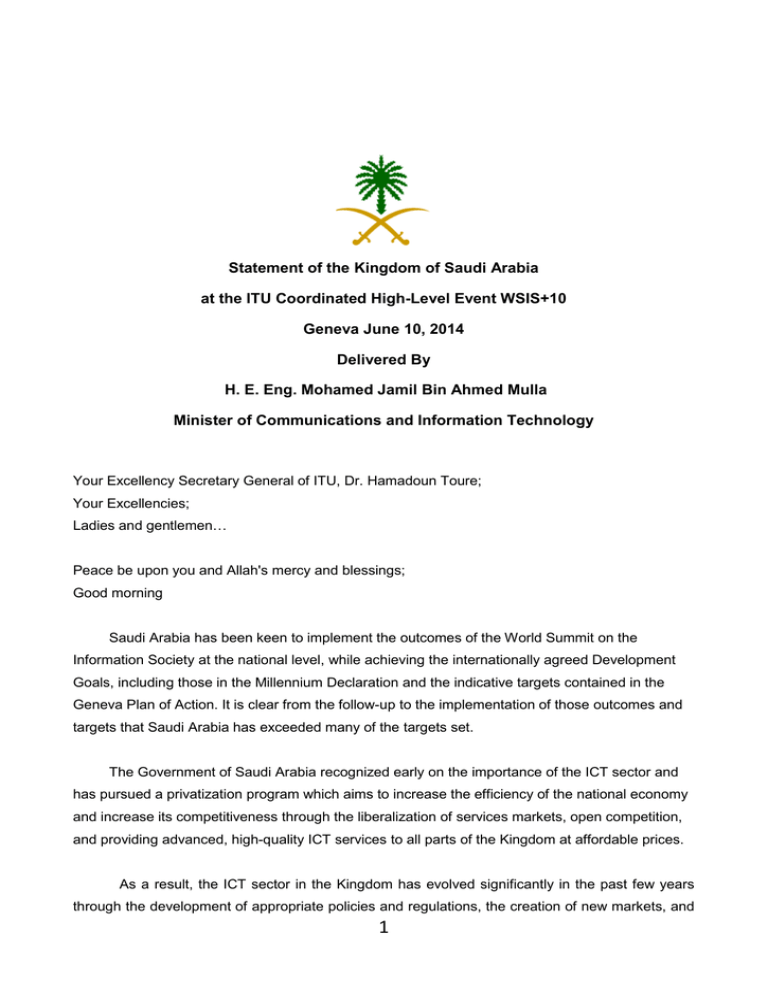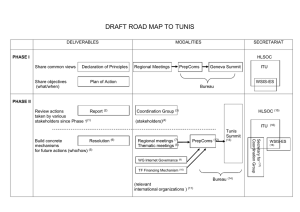Statement of the Kingdom of Saudi Arabia Geneva June 10, 2014
advertisement

Statement of the Kingdom of Saudi Arabia at the ITU Coordinated High-Level Event WSIS+10 Geneva June 10, 2014 Delivered By H. E. Eng. Mohamed Jamil Bin Ahmed Mulla Minister of Communications and Information Technology Your Excellency Secretary General of ITU, Dr. Hamadoun Toure; Your Excellencies; Ladies and gentlemen… Peace be upon you and Allah's mercy and blessings; Good morning Saudi Arabia has been keen to implement the outcomes of the World Summit on the Information Society at the national level, while achieving the internationally agreed Development Goals, including those in the Millennium Declaration and the indicative targets contained in the Geneva Plan of Action. It is clear from the follow-up to the implementation of those outcomes and targets that Saudi Arabia has exceeded many of the targets set. The Government of Saudi Arabia recognized early on the importance of the ICT sector and has pursued a privatization program which aims to increase the efficiency of the national economy and increase its competitiveness through the liberalization of services markets, open competition, and providing advanced, high-quality ICT services to all parts of the Kingdom at affordable prices. As a result, the ICT sector in the Kingdom has evolved significantly in the past few years through the development of appropriate policies and regulations, the creation of new markets, and 1 the introduction of new advanced ICT services to meet the needs of all users, whether they be individuals, the private sector or government. Keeping pace with these rapid developments, fiber optic backbone routes now extend to over 120,000 km. The Kingdom is intent on reducing developmental gaps between its regions by ensuring provision of voice and broadband Internet services to towns and villages in all remote areas through Government supported universal service projects. These universal service projects are expected to be completed by the end of 2017, covering all districts, towns and villages with telecommunications services including high-speed Internet. The availability of advanced telecommunications services in the Kingdom is reflected in the service penetration figures: fixed telephony services have reached 64% household penetration and mobile services have exceeded 170% population penetration. Broadband (high-speed Internet) is one of the most important services in the Kingdom and is key to the development of the sector. In this regard, the use of Internet services in the community has increased to more than 55% at the end of 2013 and this figure continues to increase. In addition, the amount of data traffic on mobile networks has doubled in the last years, reaching nearly 1 billion gigabytes, or an average of over 2 terabytes per day. In this context, it is worth noting that, as a result of the major rollout of e-government services after the program was launched in 2012, the Kingdom has won a number of related WSIS project prizes. Ladies and Gentlemen, Saudi Arabia is proud of its strong and active role in both phases of the World Summit on the Information Society (WSIS), and in the Working Group on Internet Governance (WGIG). We continue our ongoing support of the WSIS outcomes through our membership in the Commission on Science and Technology for Development (CSTD) of the Economic and Social Council of the United Nations (ECOSOC) for which we serve as Vice Chairman of the Committee for the Asian region at its last session, through our membership in the International Telecommunication Union (ITU) Council, through our chairmanship of the Council Working Group on International Internetrelated Public Policy Issues and through our vice-chairmanship of the Council Working Group on WSIS. 2 In this regard it was our pleasure to contribute to the preparatory process for the ITU high level event, as an extended version of the WSIS Forum, to review the implementation of the Geneva Plan of Action, which was a part of the summit outcomes, according to the principles agreed in the open and inclusive all stakeholders preparatory process for this event (Multistakeholder Preparatory Platform for the ITU WSIS +10 High Level Event). It should be noted in this regard that the Kingdom of Saudi Arabia stresses the importance of adhering to paragraph (111) of the Tunis Agenda, which requested the United Nation General Assembly to make an overall review of the implementation of WSIS outcomes in 2015. We believe that the overall review should result in an assessment of where we have succeeded and where we have not in the implementation of the WSIS outcomes, namely the Geneva Declaration of Principles, the Geneva Plan of Action and the Tunis Commitment, which includes the Tunis Agenda, the financial mechanisms for meeting the challenges of ICTs for Development, Internet Governance and related implementation and follow-up. The assessment and analysis should be both global and regional, identifying those regions that remain most disadvantaged, and should be linked to the Development Goals. For example, including but not limited to, the slow progress in implementation of the outcomes of the Tunis Agenda related to international Internet governance. To this moment, the entity that manages Internet domain names is still under the unilateral control and does not operate in accordance with international law. Furthermore, enhanced cooperation has not been implemented and operationalized; to enable governments, on an equal footing, to carry out their roles and responsibilities, in international public policy issues pertaining to the Internet, as stated in paragraphs (68) and (69) of the Tunis Agenda. We strongly believe that ITU should continue to be the overall facilitator and coordinator of all activities related to WSIS, as well as those activities related to the plan for the future that will be determined by this process. Wishing this event complete success for the good of all Nations of the world… Thank you. 3

